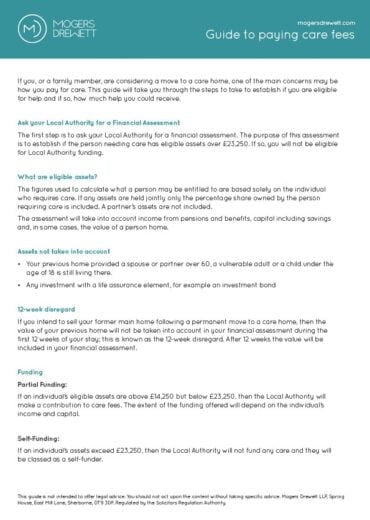Planning for long-term care
Our Later Life Support team can help you mitigate the cost of long-term care and make the transition into later life less daunting.
We are all living longer, which means the cost of long-term care is more likely to have a significant impact on family wealth. Even though old age might seem far off for many of us, it is never too soon to put some practical plans in place. There’s nothing like the peace of mind that comes with getting your affairs in order.
Our services include:
- A review of your current circumstances to help with planning for long-term care, for example advising you on the best way to structure your assets or how to mitigate care costs
- Financial planning advice to help you protect your family wealth, assets and home
- Inheritance tax planning to ensure you pass assets on to future generations
- Advice on income and capital gains tax
- Preparation of a trust to benefit someone close to you
- Drawing up a living Will so that you still have a ‘voice’ when you are no longer able to express your wishes
- Preparation of a Lasting Power of Attorney to ensure the people you trust can make the best decisions on your behalf, and that you receive any additional benefits you are entitled to
- Arranging guardianship to look after your young children should you die
Next steps: get in touch
If you need legal advice to plan for the future, contact our team of legal and financial experts on: 0800 533 5349 or enquiries@mogersdrewett.com
Meet the team
Frequently asked questions
People often need long-term care when they have a serious, ongoing health condition or disability. The need for long-term care can arise suddenly, such as after a heart attack or stroke. Most often, however, it develops gradually, as people get older and frailer or as an illness or disability gets worse.
Put a Lasting Power of Attorney (LPA) in place. An LPA is a legal document enabling you to appoint someone (an Attorney/s) you trust to make decisions for you if you are incapable of doing so in the future.
When looking at funding care the first step is to ask your Local Authority for a financial assessment. The purpose of this assessment is to establish if the person needing care has eligible assets over £23,250. If you do, you will be classed as a self-funder and expected to fund your own care using your own income, savings and in some cases, the value of your home. If any assets are held jointly, only the percentage share owned by the person requiring care is included.






